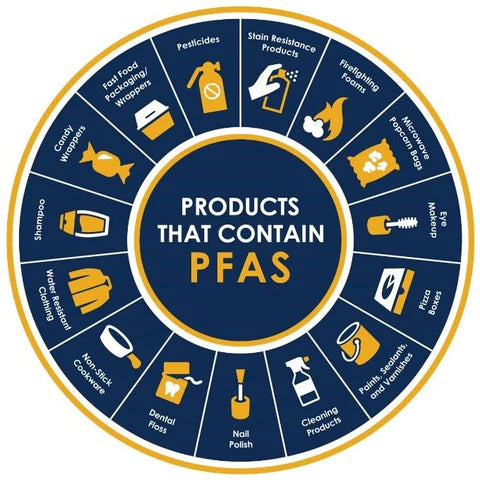PSI water filters are expertly engineered to remove PFAS (per- and polyfluoroalkyl substances) from your drinking water, tackling the pressing issue of these persistent and harmful chemicals. By utilising advanced filtration technologies, including activated carbon and ion exchange resins, PSI filters effectively capture and reduce PFAS levels, ensuring your water is cleaner, safer, and healthier for you and your family.
Integrating PSI water filters into your home system helps mitigate the health risks associated with PFAS exposure, such as liver function disruption, immune system impairment, and the latest concerns over cancer cases. Our range of high-performance systems, including the PSI-004p Counter Top, PSI-014p Twin Undersink, PSI-332 Triple Undersink, WH-002b Twin Whole House, and WH-003-SS Triple Whole House systems, guarantees the best possible water quality.
Have you ever heard of PFAS? These are per- and polyfluoroalkyl substances, a group of over 4000 chemicals that are commonly found in everyday products. But what exactly are they and where can you find them?
What are PFAS and where are they used?
PFAS are highly effective at resisting heat, stains, grease, and water, which makes them incredibly useful in a variety of applications. You can find PFAS in:
- Stain and water protection for carpets, fabric, furniture, and apparel
- Paper coatings, including some food packaging
- Metal plating
- Photographic materials
- Aviation hydraulic fluid
- Cosmetics and sunscreen
- Medical devices
Why are PFAS a concern?
While PFAS have many practical uses, they have also raised concerns due to their environmental and health impacts. In Australia, the historical use of PFAS in fire-fighting foams has led to increased levels being detected at sites like airports. These chemicals can persist in the environment for a long time and have been linked to various health issues.
How can you reduce your exposure to PFAS?
While it may be challenging to completely avoid PFAS, there are some steps you can take to reduce your exposure:
- Avoid products with stain and water-resistant coatings
- Opt for natural fabrics over treated fabrics
- Avoid fast food packaging that may contain PFAS
- Choose PFAS-free cosmetics and sunscreens
- Support companies that are committed to phasing out PFAS in their products
By being mindful of the products you use and supporting companies that prioritize environmental and human health, you can play a role in reducing the prevalence of PFAS in our daily lives.
PFAS, or per- and polyfluoroalkyl substances, are a group of widely used chemicals known for their persistence in the environment. These chemicals are found in various consumer, commercial, and industrial products, making them prevalent in our daily lives.
What are PFAS chemicals and why are they concerning?
PFAS are long-lasting chemicals that do not break down easily in the environment. Due to their widespread use, these chemicals can be found in water sources, air, fish, soil, and even in the blood of people and animals worldwide. This widespread presence raises concerns about the potential health effects associated with PFAS exposure.
How do PFAS chemicals impact human health?
Scientific studies have linked exposure to certain PFAS chemicals to harmful health effects in both humans and animals. These effects may include developmental delays, decreased fertility, immune system disorders, and an increased risk of certain cancers. The long-lasting nature of PFAS in the environment means that exposure can occur over an extended period, leading to potential health risks.
What challenges are associated with studying PFAS chemicals?
One of the main challenges in studying PFAS chemicals is the sheer number of different compounds within this group. There are thousands of PFAS chemicals, each with its own unique properties and potential health effects. This complexity makes it difficult to assess the full scope of the impact of PFAS on human health and the environment.
What can be done to address the issue of PFAS contamination?
Efforts are underway to regulate and reduce the use of PFAS chemicals in various products. Additionally, remediation techniques are being developed to clean up contaminated sites and reduce the presence of PFAS in the environment. Public awareness and education about the risks associated with PFAS exposure are also crucial in addressing this issue.
Overall, the widespread use and persistence of PFAS chemicals present a significant challenge for public health and environmental protection. By understanding the potential risks associated with these chemicals and taking proactive measures to address contamination, we can work towards minimizing the impact of PFAS on our health and the environment.
Additionally, PSI offers a variety of cartridges designed to remove PFAS from your existing systems. Trust PSI Filters for the purest water in Australia. Call us now to ensure the highest quality water for your home.

